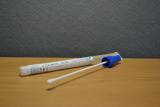Test Directory
Throat swab for culture for pharyngitis
Containers - Adult

MWE Sterile Swab with Gel
|
|
Containers - Child

MWE Sterile Swab with Gel
|
|
Laboratory Site
Old Dalkeith Road
Edinburgh
EH16 4SA
Howden
Livingston
West Lothian
EH54 6PP
Transport arrangements
Transport as soon as practicable.
Sample storage arrangements
If delay in transporting, store in fridge (4-6°C).
Special instructions for collection
Useful if:
- Patient is part of an outbreak as notified by Health Protection Team
- Patient is a healthcare worker or in regular contact with vulnerable individuals such as the immunocompromised, the comorbid, or those with compromised skin integrity
- Patient is treated with an antibiotic other than a penicillin or cephalosporin. (Locally in children approximately 90% and in adults 80% of Strep pyogenes are sensitive to clarithromycin/ azithromycin. )
- Treatment failure and recurrent/persistent tonsillitis
- Quinsy
- Penicillin allergy
- Tonsillitis with rash
- Clinical suspicion of Diphtheria
Please let us know about the following information as it may alter specimen processing:
• Treatment failure and recurrent tonsillitis, or tonsillitis with rash – we will look for Arcanobacterium haemolyticum.
• Persistent sore throat or Quinsy – we will look for Fusobacterium necrophorum.
If your patient has any of the following clinical details, please contact the Duty Microbiologist as it influences sampling, and which tests will be carried out on samples.
Testing for Corynebacterium species (C. diphtheriae and C. ulcerans, the causative agents of diphtheria) will be carried out on samples from patients where any of the following clinical details are provided.
• Membranous or pseudomembranous pharyngitis/tonsillitis
• Contact with a confirmed case of diphtheria within the last 10 days
• Travel abroad (or contact with anyone who has travelled) to a high risk area for diphtheria within the last 10 days
• Contact with any animals (including household pets, visiting a farm or petting zoo) within the last 10 days
• Recent consumption of any type of unpasteurised milk or dairy products
• Patient works in a clinical microbiology laboratory, or similar occupation, where Corynebacterium species may be handled.
How to request
GP order comms, or via Trak ("C&S - Swabs" and change site to "Swab, throat"), or request form.
Availability
Samples are processed between 0900-2000 (RIE) and 0900-1700 (SJH). Samples taken outwith these hours will be processed the following morning.
Anticipated turnaround
Up to 5 days.
What happens if the result is positive or abnormal
Result will automatically appear on TRAK and may be telephoned to originating location if required.
General additional information
Please let us know about the following information as it may alter specimen processing:
- Treatment failure and recurrent tonsillitis, or tonsillitis with rash – we will look for Arcanobacterium haemolyticum.
- Persistent sore throat or Quinsy – we will look for Fusobacterium necrophorum.
- Please indicate in the clinical details if Diphtheria testing is required.
Diphtheria
Classic respiratory Diphtheria is now rare in the UK and no longer easily recognised. Mild respiratory cases resemble Streptococcal pharyngitis and classical pseudomembrane may not develop, particularly in vaccinated individuals.
Diphtheria is a clinical and public health emergency. A strong clinical suspicion of infection needs urgent secondary care referral. Please indicate in the clinical details if Diphtheria testing is required.
Indications for testing a throat swab for Diphtheria
- Membranous or pseudomembranous pharyngitis/tonsillitis
- Contact with a confirmed case of diphtheria within the last 10 days
- Travel abroad (or contact with anyone who has travelled) to a high-risk area for diphtheria within the last 10 days
- Recent consumption of any type of unpasteurised milk or dairy products
- Occupational exposure through working in a laboratory where Corynebacterium species may be handled
- Exposure to unwell animals with ulcers that might be cutaneous diphtheria